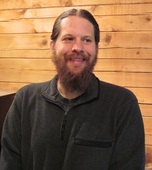 The following is a brief exchange that took place between AGTI faculty member Bryan Dieterich and a newcomer to the Institute who sought to better understand just what Gestalt Therapy is. It is reconstructed with permission. Student: Would you briefly describe Gestalt Therapy as you understand it? Bryan Dieterich: Sure...Gestalt is a humanistic psychotherapy that focuses on the power of the direct experience of the present moment and the totality of the person—mentally, physically, spiritually—as an indivisible whole. Student: Alright, but what does that practically look like? BD: It looks like two or more people gathering together and sinking into an experience of whatever is happening, here and now. There might be—no, there likely will be—some discussion of history, of what brought them together, but the emphasis is on how they experience one another in that moment. The therapist is expert, not in understanding the client and what he or she should or should not do, but rather in creating an environment for the power of the connection to manifest. I have come to firmly believe that whatever historical event or matter brought the client to the therapist will appear in the room as they engage, so the past doesn't have to be endlessly hashed out. Student: And then what? BD: Then an opportunity arises to clearly experience the dynamic. Possibly in a different manner. To become aware of patterns and to experiment with engaging differently with oneself and with another relationally. Student: Hmmm... BD: For instance, right now, as we talk, I'm aware of my stomach tightening slightly and my breath is shallower than I would like. Student: (nods) BD: I'm beginning to tell myself a story that I'm not meeting your expectations. (pauses) And as I say that, my stomach becomes quite a bit tighter. Student: I'm not sure how to respond to that. BD: Perhaps you could tell me what you are aware of as we sit together? Student: (clears throat) I...I suppose I'm aware of feeling a bit responsible for you, like I'm putting you in an uncomfortable position. BD: Where do you feel that? Student: Ummm...I'm not sure... BD: I'm quite clear that you're not responsible for me. Student: (nods) BD: And as I say that, my stomach loosens a bit. Student: That's funny, because I also feel a bit more free. (laughs) BD: (smiling) I like hearing your laugh! Student: (blushing) Good. BD: I see you are blushing. Student: It felt a bit awkward, your complimenting me just then. BD: (nods) Student: Now I'm the one breathing shallow. BD: Would you give that your attention? Your breath... Student: Mmm...hmm... (pause) I suppose I don't like being complimented so much. BD: My telling you that I felt good hearing you laugh was unpleasant? Student: No, no.... (pause) Well...sort of. Awkward. I never learned how to take a compliment. BD: (nods) And I'm aware of how little eye contact we are now making. Student: (chuckles) I suppose you are right. BD: Would you be willing to try an experiment with me Student: (shrugs) I suppose so. BD: Would you close your eyes and go entirely within? Student: (closing eyes) Ok. BD: Just take a few breaths and really tune into the experience of being drawn into yourself. Notice whatever sensations are present...no need to change them or even label them...just notice them. Student: (takes a deep breath and nods) BD: Now open your eyes and look at me. Student: (opens eyes and makes direct contact) BD: Now close your eyes and go within. Student: (closes eyes) BD: What are you aware of? Student: My chest is tense. I feel like I'm slouching a bit in this chair. (straightens up) When I sat up, I took a deep breath and my chest feels less restricted. BD: And when you're ready, open your eyes and look at me. Student: (opens eyes) BD: What are you aware of? Student: I'm aware of your eyes...they're hazel. (pauses) You're smiling slightly. You look very relaxed. I see that you're leaning to one side of the chair. BD: (nods) You see me? Student: I do. BD: I enjoyed hearing your laugh a moment ago. And I appreciate you seeing me just now. Student: (nods) Thank you. (pause) That felt different BD: How so? Student: Like I could take it in this time. Like I was ready for it. BD: That's Gestalt Therapy. Student: (laughs)
4 Comments
 We are thrilled to announce that AGTI (Appalachian Gestalt Therapy Institute) has settled into a permanent location in downtown Asheville, North Carolina. Located at Suite 110 in the Park Place building (70 Woodfin Place) AGTI will be offering a plethora of beginner, intermediate and advanced training workshops and salons throughout 2015. In addition, this new location will house the private psychotherapy practices of Nicholas Emmanuel, MA, LPC, LMFT and Bryan Dieterich, MA, LPC as well as associates Ben Lancaster, MA, LPC, Terry Slye, MA, LPC, Catie Beaulieu, MA, LPC-A, Anne Jacobe, MCSW, and Dr. Chris Mulchay, PhD. 2015 is off to an auspicious start for Gestalt Therapy in Western North Carolina! |
Author
The Appalachian Gestalt Therapy Institute is one of over 100 training centers around the world and the only center of its kind in Western North Carolina. Archives
Categories
|
 RSS Feed
RSS Feed
